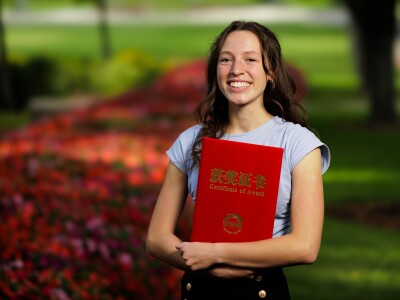A Q&A with the 2021 student commencement speaker
At BYU’s commencement exercises this week, University Honors student Alyssa Baer will represent the graduates as the student speaker. A public health major with a minor in digital humanities and technology, Baer, like her fellow classmates, has achieved much as a BYU undergraduate.
A Ballard Scholar for Social Impact and the 2020 BYU Health Promotion Student of the Year, Baer devoted herself to research and service while at BYU. Baer has published research and presented at conferences on public health topics and has worked as a teaching assistant for three courses. She has held many leadership positions at BYU’s Center for Service and Learning, volunteering with a program focused on uplifting troops and veterans for three years before becoming a representative on the Service Council during her senior year. After interning with Mothers Without Borders, she also developed her work there into a thesis for the BYU Honors Program.

University Communications’ Christie Allen sat down with Baer to discuss her experiences at BYU and her plans for the future.
Christie Allen: You wrote your honors thesis about orphan care and interned for Mothers Without Borders. Can you tell us more about your work on behalf of women and children?
Alyssa Baer: The mission of Mothers Without Borders is to strengthen communities with large populations of orphaned and vulnerable children. Many of the children we work with in Lusaka, Zambia, have lost their parents to the HIV/AIDS epidemic, and our programs seek to help these communities provide care, education, resources, and empowerment for these kids.
For my internship and thesis, I coordinated from Provo with the local team in Zambia to evaluate whether our orphan transition center was providing for the holistic well-being of the children in our care. We’ve developed evaluation protocols and data collection tools based in industry best practices to assess both the center’s progress and the progress of each child. This summer I’ll be going to Zambia to help implement some of the things I’ve been designing.
CA: In addition to your coursework, research and teaching assistant positions, you fit in a lot of service. What motivated you to make service such a prominent part of your education?

AB: Each time I serve people in the community, I’m motivated to come back and serve more. Before being on the Service Council, I was a leader in the Y-Serve program called Project Uplift, which works with troops, veterans and first responders. We would go down to the veterans home in Payson, Utah, and spend time with the veterans. They would light up when we came into the room, and they would tell us stories and give us advice about life.
In situations like that, or in my work at Mothers Without Borders, I felt so much joy and saw so much hope in people, even though in a lot of cases I wasn’t really in the most joyful settings. Finding joy and hope in difficult circumstances is a big reason why I got into public health. I loved the idea of being in a profession where every day I was trying to help someone better their life.
CA: How do you plan to use your BYU education moving forward?
AB: I will be attending grad school at George Washington University in Washington, D.C., this fall, pursuing a master’s in public health with a concentration in maternal and child health and an interdisciplinary focus on evaluation work. I’m also continuing on as the impact evaluation specialist at Mothers Without Borders. I’m really excited to keep developing evaluation models to apply what I’m learning directly to a population, which has been one of my favorite aspects of my time at BYU.
CA: As a graduating student, what advice would you give to students still working toward graduation?
AB: My biggest advice would be to get as involved as you can, whether that’s with research, with clubs and organizations or in opportunities off campus. Getting involved in each of those areas helped me to slightly pivot and learn what it is that I’m looking for out of my career and out of life. We often put a cap on ourselves and say, “I’m not qualified to do this or that.” I think it’s important to push those boundaries, to say, “I know I’m young and don’t have a ton of experience yet, but I want to contribute to this cause in any way I can.” Have the courage to jump in and learn along the way.



